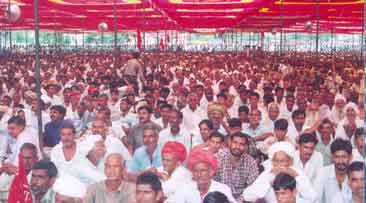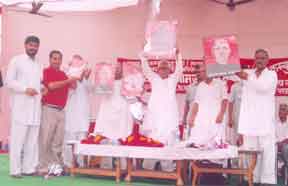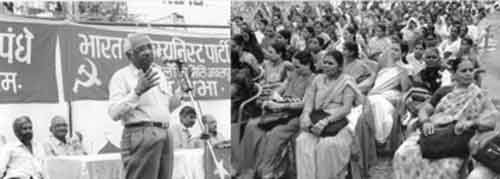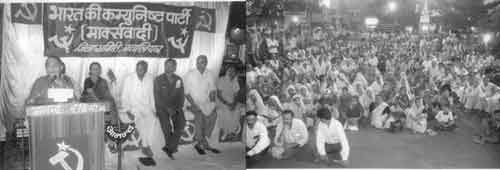 People's Democracy
People's Democracy
(Weekly
Organ of the Communist Party of India (Marxist)
No. 38
September 17, 2006
(Weekly
Organ of the Communist Party of India (Marxist)
|
Vol.
XXX
No. 38 September 17, 2006 |
Successful Conclusion Of August Campaign

A view of the massive rally in Sikar, Rajasthan held as part of August campaign
THE nearly 45-day long nationwide political campaign launched by the CPI(M) has come to a successful conclusion. At the time of going to press, the last few meetings were being held as part of the August campaign highlighting the political platform of the Party against communalism, for alternative economic policies, for addressing the immediate problems of the farmers and other sections of the working people, for strengthening the public distribution system and for an independent foreign policy. More than hundred meetings were held in various parts of the country which were addressed by central leaders of the Party, of which few were covered in these columns over this period of the campaign.
Below we give some more reports:
IN SHIMLA
ON the call of the central committee of the CPI(M), a fortnight long political campaign was organised in Shimla town as part of the August campaign. Whereas both the BJP and the Congress are bent on following the neo-liberal agenda of the international monetary agencies, the campaign highlighted the viable alternatives to these policies which benefit people. It is with this spirit that the campaign was unleashed in the Shimla town.
A mass public meeting was held on August 31 which was addressed by CPI(M) Polit Bureau member Brinda Karat. Apart from concentrating on the national issues and the importance of the campaign, three major issues of the state were also highlighted. The recent months have seen a turbulent movement in the basin of Ravi river flowing through the district of Chamba. On June 10, 2006 three leaders of CITU were murdered by the management goons only for the reason that they were unionising the Chamera III project workers. The officers and other sub contractors of the Hindustan Construction Company were arrested on the charges of the triple murder. The State as usual played in to the hands of the bourgeoisie. Their major tool i.e. the police was used to terrorise the workers so that they leave the area. The main eyewitness and the fourth person to escape death at the hands of the assailants, Pramod was arrested and tortured to change his statement so that the accused could go scot-free. A contradiction between the locals and the workers was sought to be developed on the slogan that the outsiders must be thrown out so that new workforce amongst the locals may be employed. This slogan did not click as the Kisan Sabha worked on the slogan of peasant- worker unity. Not satisfied with this, the main leader of the struggle, CITU secretary, Dr Kashmir Singh Thakur was picked up on extremely frivolous grounds. He was tortured cruelly. Stripped naked, hands and feet tied, he was beaten for more than three hours. There was also a plan to get rid of him altogether. However, the attempt was foiled from within the police. A few policemen of the rank of constables took a position not to do so and told their higher officials that they have not sold their conscience.

Buddhadeb Bhattacharya and other CPI(M) leaders greeting the crowd at Sikar rally
Brinda Karat met the chief minister and apprised him of the situation who later assured action. This issue was also highlighted in the public meeting. Karat stated that the torture of Kashmir Singh will not deter the activists of CPI(M) from organising the workers and the people on their demands and the struggle will continue with greater vigour. The all India centre of the Party and the CITU have intervened promptly, both politically and in guiding the agitation. The struggle has resulted in the payment of wages of workers of more than four months. The company which was not prepared to pay even single paisa, and at one time even refused to admit that the workmen belonged to them, were forced to pay the dues. The workers who were even struggling to get their salary of Rs 2000 got on an average of Rs 25,000 and more.
Another issue which was highlighted in the campaign was the uprooting and eviction of people from their land and hutments respectively. The government, on the pretext of orders from the courts, is uprooting poor people. More than 120 people were uprooted from their land and their apple orchards cut (nearly 3000 to 4000 trees) by the officials of forest department. The speakers exposed the class bias of the government and lambasted it. Those who have encroached upon hundreds of bighas of land are not even served notice but the ones with meagre land are directly evicted. Similarly, the people, mainly dalits who were brought to Shimla during the British raj for lifting of soil, were given small hutments in the suburbs of Shimla town. The Municipal Corporation of Shimla had provided them with regular connections of electricity and water as a measure to garner their votes. Now their hutments are being targeted by the government. More than 700 houses were demolished. The CPI(M) has remained in the forefront in their struggle against eviction. The Party has demanded alternative housing first and then eviction.
The third issue is the attack on the democratic rights of the students and virtual Congressisation of the university campus.
It is in this background that the campaign was unleashed. Jathas were organised throughout the town. The jathas were led by leaders of local committees. Tremendous response could be witnessed during this campaign, despite extremely hostile weather. Everyday it used to rain but the campaign went on undeterred. It was because of this reason that a good mobilisation turned up for the rally. The leadership initially had decided to hold the public meeting in closed doors as it rained heavily but due to pressure from the cadres, the rally was organised at the main open venue of Subzi Mandi ground. The meeting was chaired by CITU leader O P Chauhan. Others who spoke were Sanjay Chauhan, district secretary of the Party, Banita Kumari the newly elected general secretary of the student’s central association of the Himachal Pradesh University, Vijender Mehra, president of CITU Shimla district committee and Tikender Singh Panwar. Jagat Ram conducted the stage proceedings.
(Tikender Singh Panwar)
IN VIJAYAWADA

M K Pandhe addressing the August campaign meeting in Jabalpur
CPI(M) Polit Bureau member, Sitaram Yechury, asked the prime minister Manmohan Singh to take initiative to stop the system of forward trading in order to protect the interests of the farmers and consumers. Addressing a massive public meeting preceded by a huge rally organised in Vijayawada on September 2 as part of the August campaign of the Party, he expressed concern that both the farmers and consumers were being subjected to a heavy loss as a result of purchasing agricultural produce six months in advance from the farmers under the forward trading system. Yechury analysed that the prices of essential commodities could be controlled if only the system of forward trading was halted. He pointed out that the objective of the CPI(M) to keep the communal forces out of power at the centre was achieved. The voters had given a fitting reply in the elections to the Lok Sabha to all those who were propagating that the Red flag had no future, Yechury asserted. He made it clear that the government at the centre could not survive without the support of the Red flag.
The CPI(M) and the other Left parties had drawn a Lakshman rekha to the UPA government, asking it to commit to implement the common minimum programme, he said. Yechury further emphasised that the government would hear the Left’s voice only if pressure was brought on it both inside the parliament and outside through people’s movements. Manmohan Singh, as the minister for finance in the P V Narasimha Rao government, had started the process of privatisation. Today, contrary to that, as a result of the pressure on the government by the Left parties, he was constrained to announce that profit-making public sector units would not be privatised, Yechury explained.
Elaborating the alternate policies proposed by the CPI(M) for mobilisation of resources, Yechury underlined the need for adopting the economic policies of the CPI(M)-led Left Front government in West Bengal all over the country. As a result of distributing 13 lakh acres of land in West Bengal, 50 lakh families of farmers developed there. That was the secret behind the successive victories of the LF government, he said. The experience in West Bengal had proved that the people would stand by the government if it endeavoured for solving their problems, he asserted. Yechury explained that the CPI(M) was trying to build an alternative with other parties which were willing to come together on the basis of a programme and ideology, not just a third front for the sake of elections. He also found fault with the government for its pro-imperialist stance.
V Umamaheswara Rao, secretary of the Krishna district committee of the CPI(M), presided over the meeting. Paturu Ramayya, central committee member of the Party, Mantena Sitaram, secretary of the West Godavari district committee, and D Ramadevi, secretary of Guntur district committee of the Party, addressed the public meeting.
(M Venugopala Rao)
IN ORISSA

Subhashini Ali addressing the August campaign rally in Gwalior, Madhya Pradesh
ENTIRE western Orissa resounded with the opposition to the anti-people policies being pursued by the UPA government at the centre from a mammoth rally organised at Sambalpur on September 2.
CPI(M) Orissa state committee decided earlier to culminate the August campaign of the Party in five zonal rallies. As part of that programme Party cadres and sympathisers from seven districts of Sundargarh, Keonjhar, Eagarh, Jharsuguda, Sambalpur, Anugal Sonepur, Bolergir and Kalahandi participated in the rally. A colourful procession of nearly about 10,000 people was taken out from the railway station with Red flags festoons, banners and placards depicting slogans against price rise, nuclear deal, pro-imperialist foreign policy of UPA government as well as pro-MNC bent of state government. The procession reached Gangadhar Mandap of Sambalpur.
CPI(M) central committee member and leader of the Party in Lok Sabha, Basudeb Acharya, addressed the public meeting which was presided by Laxman Munda, CPI(M) MLA from Bonai assembly constituency of Sundargarh district. Other leaders who addressed the rally were CPI(M) state secretary Janardan Pati, state secretariat members Shivaji Pattanaik, Bishnu Mohenty and Sisir Hui. Leaders of different adivasi dominated districts like Banandi Dhupal, Indramani Behera, Kishore Pradhan, Kishore Jena, Brundasbar were among the speakers.
Basudeb Acharya in his speech said that the faulty policies adopted by the central government were solely responsible for the under-development of the country and the persisting distress of the people. He said that the people of the country rejected the NDA government because of its neo-liberal policies and its pro-American foreign policy. Yet the UPA government was refusing to draw proper lessons from the verdict and trying to pursue the same path, he said. The public distribution system was damaged completely and shamefully the severe agrarian crisis was resulting in thousands of farmers committing suicide. The BJP-RSS combine was trying to replicate its Gujarat mode of fascism in other parts of the country in order to divert the attention of the people from real issues. The central government has utterly failed in controlling prise rise which has made the life of common man miserable. The government is dithering in protecting the rights of scheduled tribes as was seen in its dilly-dallying on the question of Tribal Forest Rights Bill. Referring to situation in Orissa, Acharya said the economic condition of the people in the state was going down by the day due to adoption of similar neo-liberal policies by the BJD-BJP alliance government.
Basudeb Acharya gave a call to the CPI(M) members to expedite their agitational work in the rural villages with an ambition to achieve propagation of alternative policies and ultimately an alternative government in the state. “People of the country are for alternate policies, which are pro-people, but the UPA government is intent to pursue the path of neo-liberal economic policies and pro-US foreign policy. An alternative is the only solution for the development of the country”, he said.
Janardan Pati in his speech demanded publication of a white paper on the issue of “KBK Yojana”. He also blasted the state government for handing over the valuable minerals of the state to the multinational companies on a platter. In the name of industrialisation thousands of acres of valuable land was being allotted to the big monopoly houses and MNCs resulting in largescale displacement of the people of the state. Pati called for exposing this corruption of Navin government in the ensuing panchayat elections. He emphasised that an alternative force is to be built up not just for the sake of forming an alternative government but with an alternative policy to give good governance to the people of the state.
Shivaji Pattanaik highlighted the utter failure on the part of the state and central governments to check communalism. Bishnu Mohanty stressed upon the atrocities by the government officials and sate administration on the people belonging to scheduled castes and tribes.
Jasmin Gin, a student leader and president of Sambalpur University extended vote of thanks in the meeting.